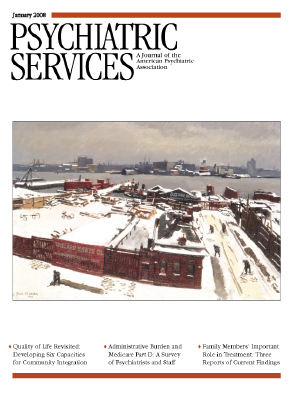Ethnic Differences in Antidepressant Treatment Preceding Suicide in Sweden
To the Editor: In the October 2007 issue Ray and colleagues (
1 ) observed that the odds of receiving treatments for mood disorders in the year preceding suicide were lower for African Americans. The study of racial-ethnic differences in drug utilization among individuals with severe mood disorders is important. We analyzed whether similar undertreatment is present in Sweden, a country of nine million inhabitants. However, because Sweden has a different racial-ethnic composition than the United States, we analyzed country of birth instead of race.
We analyzed all suicides and deaths from undetermined intent among persons aged 18 to 84 in 2006 (N=1,255, or about 95% of all suicides). We examined use of prescription drugs in the 180 days before death. Persons born in Sweden, Denmark, and Norway, representing the Scandinavian countries, were compared with persons born in all other countries.
We first looked at antidepressant prescriptions. Of the 776 Scandinavian men in the sample, 259 (32%) (age-adjusted 95% confidence interval [CI]=28.5–35.2) filled a prescription for antidepressants in the 180 days before death. The corresponding figures were 176 of the 333 Scandinavian women in the sample (52%) (CI=46.7–57.5), 32 of the 102 foreign-born men (31%) (CI=21.6–39.5), and 21 of the 44 foreign-born women (43%) (CI=28.7–58.1).
We also examined use of antipsychotic drugs. Among Scandinavian men, 100 (13%) (CI=10.1–14.5) filled a prescription for an antipsychotic in the 180 days before death. The corresponding figures were 81 of the Scandinavian women (24%) (CI=19.5–28.9), 19 of the foreign-born men (18%) (10.7–25.4), and 16 of the foreign-born women (32%) (CI=19.8–44.6). Use of lithium was 2% or less in all groups.
As a comparison we analyzed use of these drugs among persons aged 18 to 84 years in the Swedish population in 2006 by country of birth. Among Scandinavian men, 6.1% (CI=6.05–6.10) had at least one filled prescription for an antidepressant. The corresponding figure for foreign-born men was 6.5% (CI=6.43–6.59). Among Scandinavian women the figure was 11.7% (CI=11.68–11.76), compared with 11.1% (CI=11.02–11.20) for foreign-born women. We did not analyze differences in inpatient or outpatient admission before suicide, although we have previously commented on postdischarge suicides in Sweden (
2 ).
We have some minor concerns about the study by Ray and colleagues (
1 ). Data used in that study represented suicides in different periods—1986 to 2004. Over those years, at least in Sweden, policies in regard to inpatient care changed. We also suspect that use of antidepressants increased substantially in the United States since the early 1990s as a result of the introduction of selective serotonin reuptake inhibitors (SSRIs). The increase in use of SSRIs in Sweden was sixfold between 1990 and 2004. In the study by Ray and colleagues, the mean age of African Americans who committed suicide was also nearly ten years lower than that of whites, which may indicate socioeconomic or other differences in the underlying white and African-American populations from which the samples were drawn.
Although one might suspect relative undertreatment of psychiatric disorders in the non-Scandinavian population in Sweden, it could not be verified by our analyses because we studied only drug utilization without knowledge of the underlying disease prevalence. However, the rates of prescription were similar for Scandinavians and foreign-born persons in our sample who filled a prescription for an antidepressant in the months before they committed suicide—and who therefore could be said to have been suffering from a severe mood disorder. This, together with the observed similar rates of prescription in the general population, could indicate equal access to drug treatment. The study by Ray and colleagues highlights an important issue in research on socioeconomic inequalities in care. Racial-ethnic differences in the use of medications may result from differences in religious and cultural beliefs that can affect both health-seeking behavior and attitudes toward suicide.

